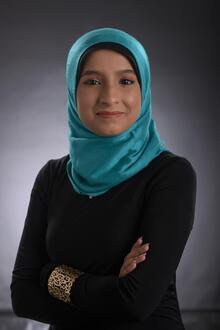Why did you pursue your graduate studies at the University of Waterloo?
I completed my undergrad at the University of Waterloo graduating with a BSc in Honours Health Studies as well as both the Pre-Clinical and Health Research Specializations, the Aging Studies option, and a minor in Medical Physiology. Through my undergrad thesis, I was able to create a project from scratch and pilot a study to answer a research question of my interest. This led me into pursuing the research field and academia. Meeting with my supervisor allowed me to see the incredible work being conducted here at UWaterloo and the many opportunities available to advance health in a field I am passionate about through research.
My minor allowed me to take classes outside of my department and interact with a slightly different field of study. I was able to see first-hand the constructive and friendly environment fostered in the Kinesiology department here at Waterloo. Everyone from your peers to your profs wants to support your learning and see you realize your potential.
Additionally, the department also offered guaranteed funding and my supervisor’s lab offered the chance to work collaboratively in a large team supporting and contributing to each other’s projects. So, choosing Waterloo was a no-brainer.
 Describe your research and what makes you passionate about it
Describe your research and what makes you passionate about it
My thesis is a part of a multi-institution effort to understand the health impact of inactivity for the benefit of older adults and astronauts. The study constitutes a randomized control trial that subjects older adults to a period of constant bed rest with and without exercise while monitoring all physiological, neurological and phycological through copious data collection. The aim is to simulate the experience of bed rest in a hospital setting and understand how it impacts their health and frailty.
As a part of the nutrition and aging lab, we are aiming to understand how satiety changes throughout bed rest and what factors mitigate or exacerbate the implications of bed rest using data from the pre and post-meal visual analogue scale satiety questionnaires. The blood samples collected will also be analyzed in an attempt to identify possible biomarkers for satiety.
My undergraduate work stressed the importance and unique nature of Health in older adults. I became interested in working with this population after volunteering in the Chemotherapy Suite at Grand River Regional Cancer Centre (GRRCC). So, I jumped at the opportunity to work on a study that was collecting primary data that could impact such a large part of the way that we handle elder care in the healthcare system.
I love that throughout the process, I've had the opportunity to design my research question, suggest and implement my ideas, as well as receive constant feedback and opportunities for advancement. I also like that I get to work both in a wet lab and a computer lab.
Tell us about what activities, groups, events you are involved in
I am currently serving on the Human Research Ethics Board and was recently elected as the grad student representative for the University of Waterloo Senate. I have previously served as the Health Sciences faculty representative on Senate as well as Waterloo Undergraduate Student Association’s (WUSA) Student Council. I am a big proponent of the student voice, and this is how I put my words into action. My aim is to best represent student interests on key issues through active representation, voicing the student perspective and fighting for student needs.
What campus services have you accessed and how have they been useful to your academics or your well-being as a student?
I took advantage of the instructional classes offered to students at the Physical Activities Complex (PAC) to learn to swim which is a passion of mine. It helped me to go from being afraid to be in a pool to jumping confidently into the deep end. I have frequently used co-op and Professional Development (PD) resources as well as online tools through the UWaterloo website.
How has grad school helped you develop your teaching skills?
I love to teach and have been a TA in many different departments across campus over my undergrad and grad career. I have worked and volunteered in the first-year chemistry and anatomy labs as well as in multiple courses in the professional development department. As a graduate TA, I have been able to take on a supervisory leadership role, being able to guide undergrad TAs who work with me. It has allowed me to expand my skills and share my expertise with others. I also love to tutor, and the flexible schedule of grad studies allows me to do so.
What advice do you have for new graduate students?
My best advice is to get involved as much as possible. When you see opportunities, whether it’s to present somewhere, join a club or lend your expertise somewhere, I recommend taking every chance that comes your way. This campus is very large and full of incredible opportunities that are waiting for you to seize them. Ask questions when you're curious and work on finding solutions and answers. Apply even when you think you don't have a shot. You don't know where your next great adventure will start.
Do you have anything else you’d like to share that is interesting about yourself?
My favourite quote is “This Too Shall Pass”. In hard times it’s a reminder that you will get through it and there is another day, another opportunity yet to come. In great times, it’s a reminder to recognize what you have and appreciate the people in your life. It’s a mantra that helps me to navigate through the best and worst of times.
Country of origin: Canada
Domestic or International: Domestic
Academic stream: Research
Full-time or part-time: Full-time
Research supervisor: Dr. Heather Keller
Graduate student awards held: GRS and TA/RA (multiple)
TA/RA or GRS held: GRS




